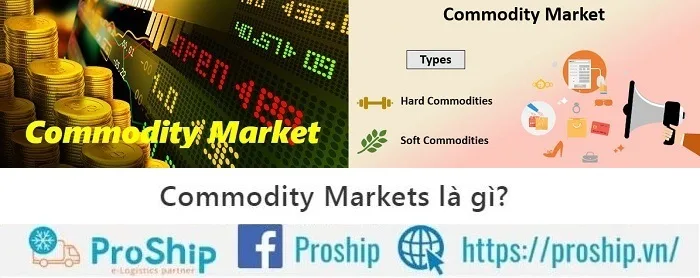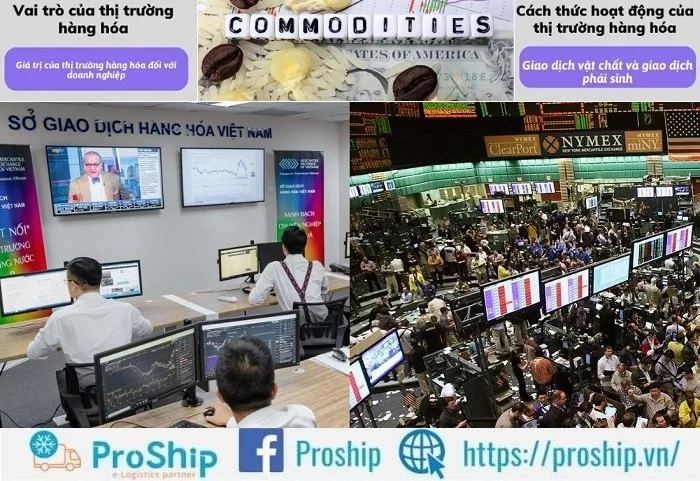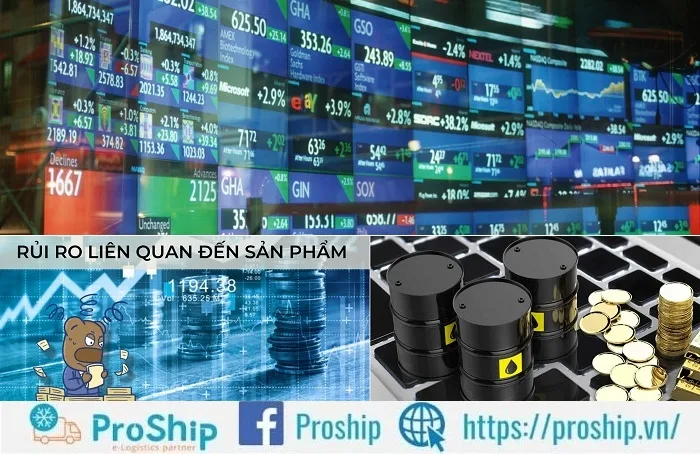x Bạn có ý định đầu tư vào thị trường Commodity Market và muốn biết cơ chế hoạt động của nó?
x Bạn quan tâm tới vai trò, tác dụng của thị trường Commodity Market là gì, mua bán những gì?
x Bạn thắc mắc nếu đầu tư vào Commodity Market thì có gặp phải những rủi ro gì hay không?
Thị trường hàng hóa trong tiếng Anh là Commodity Market. PROSHIP.VN sẽ góp nhặt kiến thức từ nhiều nguồn đáng tin cậy để giải đáp cho Quý Doanh nghiệp, Nhà đầu tư hiểu rõ về thuật ngữ commodity market. Cùng với đó, chúng tôi cũng chỉ ra đâu là những rủi ro bạn có thể gặp phải một khi tham gia vào commodity market. Từ đây dễ dàng lường trước các biến động về tỷ giá, về tác động thời tiết, về tính pháp lý, về thị trường toàn cầu,…để có sự cân nhắc, tính toán đầu tư hợp lý hơn.
📦 Hotline Liên Hệ Vận Chuyển
🧭 Miền Trung
Commodity Market là gì? Mua bán những gì?
Khái niệm Commodity Market
Commodity market là gì? Commodity Markets hay thị trường hàng hóa được biết đến là một sàn giao dịch vật lý truyền thống hoặc sàn ảo giúp Doanh nghiệp có thể mua bán hay kinh doanh các sản phẩm thô hoặc sơ cấp. Nhà đầu tư thông thái có thể tham gia thị trường hàng hóa thông qua các Công ty liên quan trực tiếp đến hàng hóa hoặc ký các hợp đồng tương lai, hợp đồng quyền chọn, tham gia các quỹ ETF.
Thông thường, Commodity Markets gồm 4 mặt hàng chủ đạo là nông sản, nguyên liệu công nghiệp, kim loại và năng lượng. Thị trường này sẽ tạo điều kiện mở rộng quy mô sản xuất, thúc đẩy tiêu dùng, dự trữ hàng hóa và đa dạng hóa các loại sản phẩm đồng thời ổn định sản xuất nguồn hàng.

Commodity Markets mua bán gì?
Commodity Markets chia thành 2 loại là hàng hóa cứng và hàng hóa mềm, cụ thể:
- Hàng hóa cứng là các sản phẩm khai thác, khai quật từ tài nguyên thiên nhiên như vàng, quặng, dầu, cao su,…
- Hàng hóa mềm chủ yếu là các sản phẩm từ nông nghiệp và động vật. Chẳng hạn như: Ngô, cà phê, cây trái, thịt…
Một số sàn giao dịch hàng hóa lớn trên thế giới như:
- Sở giao dịch hàng hóa Chicago (CME): Cung cấp giao dịch các sản phẩm tiền tệ, chỉ số, tỷ giá, thịt…;
- Sàn giao dịch kim loại London (LME): Cung cấp giao dịch các mặt hàng liên quan tới kim loại;
- Sở giao dịch liên lục địa (ICE): Cung cấp giao dịch năng lượng, dầu và sản phẩm nông nghiệp…;
- Sàn giao dịch hàng hóa Tokyo (TOCOM): Chuyên giao dịch kim loại, năng lượng, sản phẩm nông nghiệp, cao su tự nhiên;
- Sở giao dịch hàng hóa New York (NYMEX): Chuyên giao dịch mặt hàng kim loại và năng lượng.
>>Xem thêm: Giffen Good là gì?
Commodity market hoạt động ra sao, có yêu cầu và vai trò gì?
Cách thức hoạt động của thị trường hàng hóa
Thị trường hàng hóa gồm giao dịch vật chất và giao dịch phái sinh thông qua việc sử dụng giá giao ngay, hợp đồng kỳ hạn và hợp đồng quyền chọn.
Để phòng ngừa rủi ro về giá, suốt nhiều thế kỷ, người ta đã sử dụng hình thức giao dịch phái sinh. Giao dịch phái sinh mà một dạng giao dịch bằng hợp đồng với giá trị hợp đồng xác định dựa trên giá trị của hàng hóa (tài sản cơ sở). Giao dịch sẽ được thực hiện thông qua các Sở giao dịch hàng hóa tập trung hoặc qua thị trường phi tập trung.
Ngày càng nhiều công cụ phái sinh được hình thành trong giao dịch: hợp đồng kỳ hạn, hợp đồng kỳ hạn tiêu chuẩn, hợp đồng hoán đổi. Năm 2003, quỹ hoán đổi ETF ra đời, cho phép nhà đầu tư giao dịch vàng dựa trên vàng điện tử mà không cần sở hữu vàng hiện vật, chi phí bảo hiểm và lưu trữ giống như thị trường vàng thỏi London.
Yêu cầu với thị trường hàng hóa
Được biết, tại Mỹ, Ủy ban Giao dịch Hàng hóa Tương lai (CFTC) kiểm soát thị trường hàng hóa tương lai và thị trường quyền chọn. Mục tiêu của CFTC là thúc đẩy các thị trường cạnh tranh, hiệu quả và minh bạch, giúp bảo vệ người tiêu dùng khỏi gian lận, thao túng và các hành vi vô đạo đức. Sự điều tiết của thị trường hàng hóa đã tiếp tục được chú ý sau khi 4 ngân hàng đầu tư hàng đầu bị cuốn vào một cuộc điều tra thao túng kim loại quý trong năm 2014.

Vai trò, tác dụng của thị trường hàng hóa
Đối với doanh nghiệp, giá trị của thị trường hàng hóa được biểu hiện ở:
- Môi trường thực hiện các giao dịch kinh doanh của cá nhân và tổ chức trên cả nước, giúp người bán và người mua đàm phán thỏa thuận và giao dịch được thông qua các phương tiện viễn thông hiện đại;
- Người mua và người bán có thể cạnh tranh bình đẳng với nhau nhờ mối quan hệ giữa cung và cầu. Số lượng mua bán nhiều hay ít sẽ thể hiện rõ quy mô của thị trường là lớn hay nhỏ. Khối lượng hàng hóa, dịch vụ kèm theo giá cả cũng sẽ do quan hệ cung-cầu quyết định;
- Rút ngắn quá trình giao dịch của các tổ chức, chủ thể kinh tế về mặt hàng hóa, cách thức sản xuất và quyết định của người lao động thông qua quyết định về giá cả;
- Các khách hàng (gồm khách hàng hiện có và tiềm ẩn) tham gia thị trường hàng hóa để thỏa mãn nhu cầu và mong muốn của bản thân.
Tác dụng của thị trường hàng hóa phải kể đến như:
- Thúc đẩy nhu cầu tiêu dùng trong cộng đồng và nhu cầu chất lượng sản phẩm trong sản xuất;
- Tạo điều kiện mở rộng quy mô sản xuất hàng hóa và bảo đảm hàng hóa luôn tới tay người mua đầy đủ, nhanh kịp thời;
- Dự trữ hàng hóa cho tiêu dùng và sản xuất, đảm bảo sự cân bằng cho cung – cầu;
- Ổn định sản xuất, ổn định nguồn hàng cung ứng cho người tiêu dùng;
- Phát triển sự phong phú, đa dạng cho hoạt động sản xuất và tiêu dùng.
📦 Hotline Liên Hệ Vận Chuyển
🧭 Miền Trung
Những rủi ro về sản phẩm và thị trường khi đầu tư Commodity Markets
Khái niệm thị trường hàng hóa commodity market là gì, cách thức hoạt động, các sản phẩm mua bán, yêu cầu ra sao,…đã được giải đáp. Proship sẽ tiếp tục chia sẻ về những rủi ro mà Nhà đầu tư có thể gặp phải khi đầu tư vào commodity market:
Rủi ro về sản phẩm
Khi đầu tư vào Commodity Markets (thị trường hàng hóa), nhà đầu tư cần phải cân nhắc đến những rủi ro sau:
- Về giá cả: Giá cả của các sản phẩm hàng hóa có thể thay đổi nhanh, liên tục. Những biến động đáng kể có thể xảy ra bất thình lình do các yếu tố như thời tiết, sản lượng, nhu cầu và kế hoạch sản xuất của quốc gia;
- Về khả năng thực hiện hợp đồng: Nếu bạn đầu tư vào các sản phẩm hàng hóa thông qua việc mua bán hợp đồng tương lai, rủi ro phá sản của đối tác thương mại có thể gây ra thiệt hại lớn;
- Về tài chính: Đầu tư vào Commodity Markets dễ gây ra rủi ro tài chính lớn, đặc biệt là đối với nhà đầu tư cá nhân hoặc những người chưa có kinh nghiệm đầu tư. Việc đầu tư vào các sản phẩm hàng hóa không đảm bảo sinh lời và rất dễ mất mát vốn;
- Về pháp lý: Khi đầu tư vào Commodity Markets, nhà đầu tư cần nắm rõ các quy định và luật pháp quốc tế, nội địa. Nếu không tuân thủ đúng quy định sẽ có thể dẫn đến hậu quả pháp lý nghiêm trọng;
- Về thị trường toàn cầu: Thị trường hàng hóa phụ thuộc nhiều yếu tố khác nhau và có sự liên kết với nhiều thị trường khác. Chính sách kinh tế của một quốc gia hoặc sự biến động của thị trường toàn cầu làm ảnh hưởng lớn đến giá cả của các sản phẩm hàng hóa.

Rủi ro về thị trường
Khi đầu tư vào Commodity Markets, nhà đầu tư sẽ đối mặt với một số rủi ro sau:
- Về giá cả: Nhà đầu tư phải đối mặt với khả năng giá sẽ giảm hoặc tăng đột ngột trong khoảng thời gian ngắn. Điều này dễ dẫn đến thiệt hại nếu không có kế hoạch bảo vệ và quản lý rủi ro tốt;
- Về thế giới và chính trị: Các thay đổi chính trị và sự kiện quốc tế có thể ảnh hưởng đến giá trị hàng hoá. Ví dụ, chiến tranh thế giới có thể tạo ra một số rủi ro mới cho đầu tư vào các mặt hàng như dầu, đồng, thép,…;
- Về biến động tỷ giá: Giá các mặt hàng thường được dựa trên đơn vị tiền tệ của nước sản xuất. Vì vậy, những biến động trong tỷ giá có thể ảnh hưởng đến giá trị của khoản đầu tư;
- Về thời tiết: Ảnh hưởng thời tiết như lũ lụt, hạn hán hoặc bão có thể làm giảm sản lượng và tăng giá trị sản phẩm;
- Về vấn đề kỹ thuật: Các vấn đề kỹ thuật như gián đoạn sản xuất hoặc vận chuyển có thể ảnh hưởng đến giá cả.
=> Tóm lại, nhằm giảm thiểu rủi ro, nhà đầu tư nên tìm hiểu thật kỹ về thị trường và các yếu tố ảnh hưởng trước khi đầu tư, sử dụng các kỹ thuật quản lý rủi ro và để giảm thiểu thiệt hại, hãy đặt các lệnh stop loss.
Proship Logistics đã tổng hợp nhanh kiến thức cơ bản giúp nhà đầu tư biết được commodity market là gì, cách thức hoạt động của thị trường hàng hóa ra sao…Muốn tham gia đầu tư vào commodity market, bạn chỉ cần số vốn nhỏ nhưng lợi nhuận đem lại vô cùng linh hoạt dựa trên biến động giá cả của thị trường. Hãy tiếp tục theo dõi tin bài chia sẻ tiếp theo để cập nhật nhiều kiến thức hữu ích và liên hệ 0909 344 247 để được cung cấp Dịch vụ vận tải Đa phương thức giá rẻ.
📦 Hotline Liên Hệ Vận Chuyển
🧭 Miền Trung

